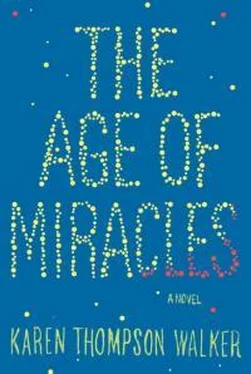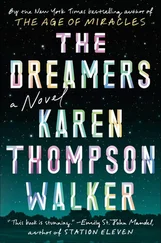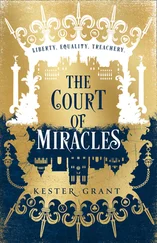My mother began calling the phone numbers that were posted on my grandfather’s refrigerator. They were mostly members of his church, the phone tree, the carpool. The house still smelled like my grandfather, like Listerine and old paper. An antique clock chimed seven times in the living room. My mother’s voice cracked as she talked, leaving her cell phone number in case he turned up.
My father soon returned to us with news: Chip had dropped out of high school and moved away.
“Moved where?” said my mother.
My father rubbed his forehead and blinked a slow blink. A sliver of sun had peaked above the horizon and was shining through the windows, illuminating the dust that floated everywhere in that house. Back then a certain euphoria usually accompanied the arrival of sunshine after so many hours in the dark, but we barely noticed it that night. We all just squinted in the brightness.
“His mother says Chip went to that place in the desert,” said my father. “Circadia. He left last night.”
Circadia did not exist on any map. In the section of the Thomas Guide where we had heard it would be, we found only a patch of blank space, a slight crease in the page, a wash of beige symbolizing desert. So it felt as if we were heading to a fictive place, some imagined land, dreamed up or invented. And in one sense, we were. Once in the desert, we would leave the two-lane highway for a hairline road that dead-ended on the map but would lead eventually to a second road, unpaved and too new for the maps to register. This was how we would reach Circadia.
“Do you think he’s really there?” said my mother. Sunlight was streaming in through the windshield. She adjusted the overhead visor.
“Maybe,” said my father. His eyes were narrow against the rising sun. It was nine o’clock at night. “Maybe not.”
We had called the police from my grandfather’s house, but he was not a missing person. Old and eccentric but not senile, he had packed up his own things before leaving.
We drove toward the desert right away, skipping dinner. The highway curved through the hills, some of them blackened from the recent fires. The temperature rose with every mile. Out there, plant life had always struggled to survive, so the land looked less ravaged than the coastal regions did. A few scruffy bushes persisted on the rocky slopes, looking no more spindly than usual.
“It’s just so hard to picture your father joining anything,” said my mother.
“He belongs to a church,” I said from the backseat.
Power lines were whipping by beside the road, undulating as they traveled from pole to pole.
“Don’t you think it’s hard to imagine?” said my mother.
“Helen,” said my father. He sat stiffly in his seat, both hands on the wheel, eyes straight ahead. “I just don’t know.”
The radio turned to static as the last of the suburbs fell away. Traffic thinned. The land flattened. The desert peeled open all around us, and the blue sky hung low to the ground. The sun hovered for hours on the horizon.
The surface of the road blurred in the heat, and I began to smell the leather of the seats in the car, the surfaces cooking in the sun. My mother turned up the air.
As the hours passed, we all began to yawn. My father rubbed the edge of his chin, where a layer of stubble had formed since the morning.
We passed the ruins of an ancient gas station where one pump remained, rusted red. Beside it stood a humble sun-bleached structure leaning heavily to one side, without its roof. There was a certain heartbreak in that scene. Someone had built those walls. Someone had once felt some kind of hope for the future of this place. Now you could see right through the cracks in the walls to the sky on the other side.
Eventually, I fell asleep, my head against the window. I dreamed that we moved to Circadia but that we brought our house with us—only the views and the neighbors changed.
I awoke sometime after ten P.M. to the bumping of the car over dirt.
“Go slower,” said my mother. She was holding tight to the handle in the ceiling. We were driving straight into the sun.
Through the haze, I could see the outline of rooftops in the distance, neat rows of white houses bordered by an ocean of sand dunes rippling across the desert.
The developer’s original sign still stood at the entrance, a heavy slab of granite, fronted by a dry fountain and a patch of dead grass. Etched in thick cursive were the words: THE HOMES AT RANCHO DOMINGO DEL SOL. Above the sign, a makeshift banner flapped from two posts: WELCOME TO CIRCADIA. Beneath that, someone had written, Land of the Free .
I was secretly thrilled. I had the idea from Gabby that maybe this was a place where life was more fair.
The streets had names like Desert Rose Lane and Dune Way. Some were paved. Others weren’t. Clear Sky Drive ran paved for a few hundred feet and then sputtered out into dirt, as if to record the precise moment in time when the developer had run out of cash.
“Can you imagine living out here?” said my mother.
The houses stood in varying stages of completion. Some lacked garages, others roofs. Some were just wooden frames naked of dry-wall and stucco, the studs beginning to weather in the hot, dry air. But you could see what the developer had been aiming for: twelve streets aspiring to a suburb. The nearest grocery store was an hour away.
Though it was ten-thirty at night, Circadia was just waking up. Twenty-five hours of daylight stretched out ahead of us. Hammers echoed in the distance. Somewhere, a saw buzzed.
A man in a faded blue T-shirt and a wide-brimmed hat was crouched in a gravel driveway, pouring white paint into a tray. Beside him, a ladder leaned against a house.
My father slowed the car, rolled down his window. It was hard to breathe the desert air.
“Excuse me,” my father called out from the car.
The man turned, squinted.
“I’m looking for my father. He’s in his eighties, and his name is Gene. Have you seen him?”
The man walked over to our car. His face was badly sunburned, and the beginning of a black beard was growing on his cheeks and chin.
“Did he tell you he was coming here?” he said when he reached my father’s window.
I had the idea that the people of Circadia had not only escaped the clocks but had also managed to slip loose of time itself. I searched the man’s face for evidence that he was different from us, somehow changed. I imagined the transformation might be deep, molecular, as if every atom in his body were right then spinning at a slightly slower speed than the atoms in ours. Sweat dripped along his hairline. Sweat was showing through his T-shirt.
“He would have arrived last night,” said my father, who was still in his white collared shirt. His wristwatch flashed in the sun. The air conditioner struggled against the wafting heat.
The man glanced at me through the window. He chewed his lower lip. I was aware of the ticking of our dashboard clock as it registered in neon the passage of one more minute, our Volvo a separate universe in which time raced by at high speed.
“He might have come here with a seventeen-year-old kid,” said my mother, leaning toward the driver’s side. “Named Chip.”
The man rubbed his forehead with the back of his wrist. He touched the brim of his hat.
“If he didn’t tell you he was coming here,” he said, “maybe he didn’t want you to know.”
We gave up and drove on, but the man stood in his driveway for a while, his hands on his hips, watching our car move down the street.
We came to a fork in the road and turned right, where we found a woman walking a yellow lab.
“Sorry,” she said. “Haven’t seen them.”
Читать дальше












